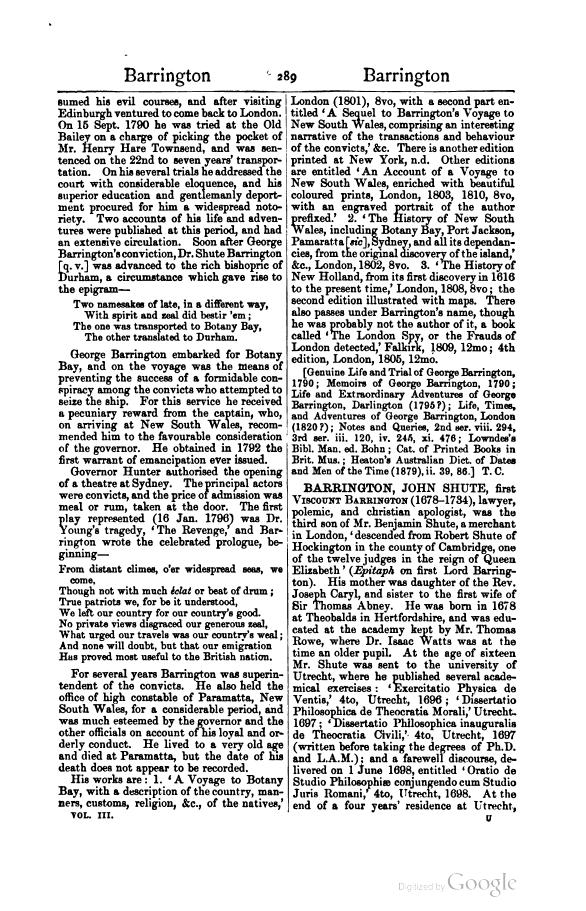sumed his evil courses, and after visiting Edinburgh ventured to come back to London. On 15 Sept. 1790 he was tried at the Old Bailey on a charge of picking the pocket of Mr. Henry Hare Townsend, and was sentenced on the 22nd to seven years' transportation. On his several trials he addressed the court with considerable eloquence, and his superior education and gentlemanly deportment procured for him a widespread notoriety. Two accounts of his life and adventures were published at this period, and had an extensive circulation. Soon after George Barrington's conviction, Dr. Shute Barrington [q. v.] was advanced to the rich bishopric of Durham, a circumstance which gave rise to the epigram—
Two namesakes of late, in a different way,
With spirit and zeal did bestir 'em;
The one was transported to Botany Bay,
The other translated to Durham.
George Barrington embarked for Botany Bay, and on the voyage was the means of preventing the success of a formidable conspiracy among the convicts who attempted to seize the ship. For this service he received a pecuniary reward from the captain, who, on arriving at New South Wales, recommended him to the favourable consideration of the governor. He obtained in 1792 the first warrant of emancipation ever issued.
Governor Hunter authorised the opening of a theatre at Sydney. The principal actors were convicts, and the price of admission was meal or rum, taken at the door. The first play represented (16 Jan. 1796) was Dr. Young's tragedy, ‘The Revenge,’ and Barrington wrote the celebrated prologue, beginning—
From distant climes, o'er widespread seas, we come,
Though not with much éclat or beat of drum;
True patriots we, for be it understood,
We left our country for our country's good.
No private views disgraced our generous zeal,
What urged our travels was our country's weal;
And none will doubt, but that our emigration
Has proved most useful to the British nation.
For several years Barrington was superintendent of the convicts. He also held the office of high constable of Paramatta, New South Wales, for a considerable period, and was much esteemed by the governor and the other officials on account of his loyal and orderly conduct. He lived to a very old age and died at Paramatta, but the date of his death does not appear to be recorded.
His works are:
- ‘A Voyage to Botany Bay, with a description of the country, manners, customs, religion, &c. of the natives,’ London (1801), 8vo, with a second part entitled ‘A Sequel to Barrington's Voyage to New South Wales, comprising an interesting narrative of the transactions and behaviour of the convicts,’ &c. There is another edition printed at New York, n.d. Other editions are entitled ‘An Account of a Voyage to New South Wales, enriched with beautiful coloured prints, London, 1803, 1810, 8vo, with an engraved portrait of the author prefixed.’
- ‘The History of New South Wales, including Botany Bay, Port Jackson, Pamaratta [sic], Sydney, and all its dependancies, from the original discovery of the island,’ &c., London, 1802, 8vo.
- ‘The History of New Holland, from its first discovery in 1616 to the present time,’ London, 1808, 8vo; the second edition illustrated with maps.
There also passes under Barrington's name, though he was probably not the author of it, a book called ‘The London Spy, or the Frauds of London detected,’ Falkirk, 1809, 12mo; 4th edition, London, 1805, 12mo.
[Genuine Life and Trial of George Barrington, 1790; Memoirs of George Barrington, 1790; Life and Extraordinary Adventures of George Barrington, Darlington (1795?); Life, Times, and Adventures of George Barrington, London (1820?); Notes and Queries, 2nd ser. viii. 294, 3rd ser. iii. 120, iv. 245, xi. 476; Lowndes's Bibl. Man. ed. Bohn; Cat. of Printed Books in Brit. Mus.; Heaton's Australian Dict. of Dates and Men of the Time (1879), ii. 39, 86.]
BARRINGTON, JOHN SHUTE, first Viscount Barrington (1678–1734), lawyer, polemic, and christian apologist, was the third son of Mr. Benjamin Shute, a merchant in London, ‘descended from Robert Shute of Hockington in the county of Cambridge, one of the twelve judges in the reign of Queen Elizabeth’ (Epitaph on first Lord Barrington). His mother was daughter of the Rev. Joseph Caryl, and sister to the first wife of Sir Thomas Abney. He was born in 1678 at Theobalds in Hertfordshire, and was educated at the academy kept by Mr. Thomas Rowe, where Dr. Isaac Watts was at the time an older pupil. At the age of sixteen Mr. Shute was sent to the university of Utrecht, where he published several academical exercises: ‘Exercitatio Physica de Ventis,’ 4to, Utrecht, 1696; ‘Dissertatio Philosophica de Theocratia Morali,’ Utrecht, 1697; ‘Dissertatio Philosophica inaguralis de Theocratia Civili,’ 4to, Utrecht, 1697 (written before taking the degrees of Ph.D. and L.A.M.); and a farewell discourse, delivered on 1 June 1698, entitled ‘Oratio de Studio Philosophiæ conjungendo cum Studio Juris Romani,’ 4to, Utrecht, 1698. At the end of a four years' residence at Utrecht,
